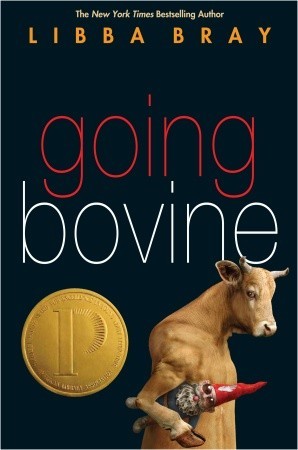
Going Bovine
by Libba Bray
“These are hard times. The world hurts. We live in fear and forget to walk with hope. But hope has not forgotten you. So ask it to dinner. It's probably hungry and would appreciate the invitation.”
All 16-year-old Cameron wants to do is detach and snark and perhaps get with his sister's hot friend. When he comes down with Mad Cow disease, however, everything is off the table. There is no cure. That is, until Cameron sees a beautiful punk rock angel in his hospital room who tells him he must go on a quest to find Doctor X, rescue him from the forces of darkness threatening to destroy the universe, and get his cure. With nothing to loose, he sets off on a roadtrip across America with a hypochondriac dwarf and a lawn gnome who claims he is the god Baldur from Norse mythology.
The thing that hooked me before I even picked up the book was that this was a retelling of Don Quixote. I regret to say, I have never read the original, but there were definite iconic moments I grasped, like tilting with windmill giants, the sidekick, the black knight, and the family who keep trying to bring him back to their reality.
The beginning is brilliant. Cameron describes the best day in his life, the day he went to Disney World, until he rode on the It's a Small World ride, had a weird feeling that they had all died and this was the afterlife, and nearly drowned trying to find what was behind one of the access doors in the ride, sure it was something mystical. Fast forward to 16 years later when Cameron is pretty unlikable. He doesn't try, because why should he? But that all changes when he accepts the quest. He discovers there are things worth fighting for.
This book has some pretty incredible moments. Bray captures images with such weighted specificity. Every piece of the landscape informs the emotional state of Cameron. She is brilliant at creating these moments where reality completely bends and a veil is torn to see what metaphysical things are going on beneath every day life. And yet you are never quite sure if Cameron is really there. Is he traveling across the US, or still hallucinating in his hospital bed? Did he see those fire giants with swinging arms, or was it the disease? She creates these scenes that instill mind-bending terror and awe at the inexplicably and dispassion of such occurrences. In the end, it doesn't matter if it all happened in his head or not. His emotional journey from apathy to deep and painful caring is the same. Bray doesn't pull punches and lets the story play out to it's often heartbreaking conclusions. It is a beautiful and HI-larious story about connecting, and living life and having adventures while you can.
She also gives some great commentary on media and modern public schools which made me laugh.
I highly recommend this book.
Books like this
Odd Thomas by Dean Koontz




